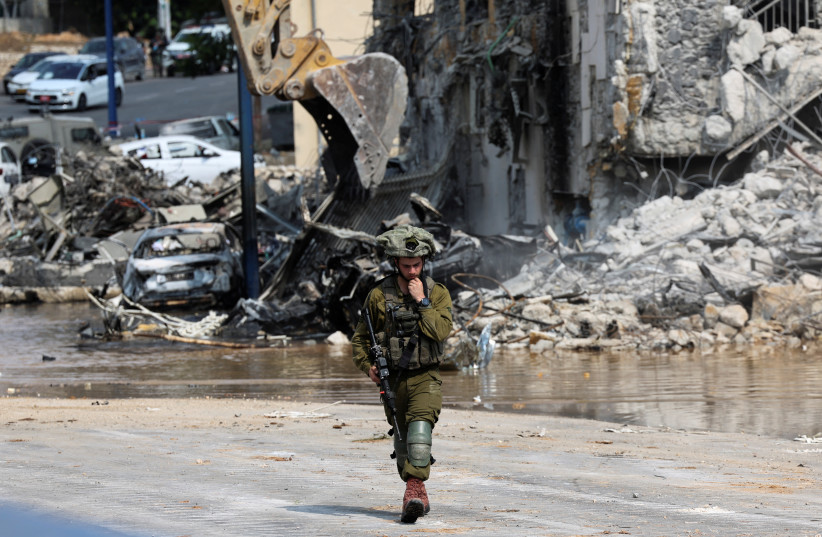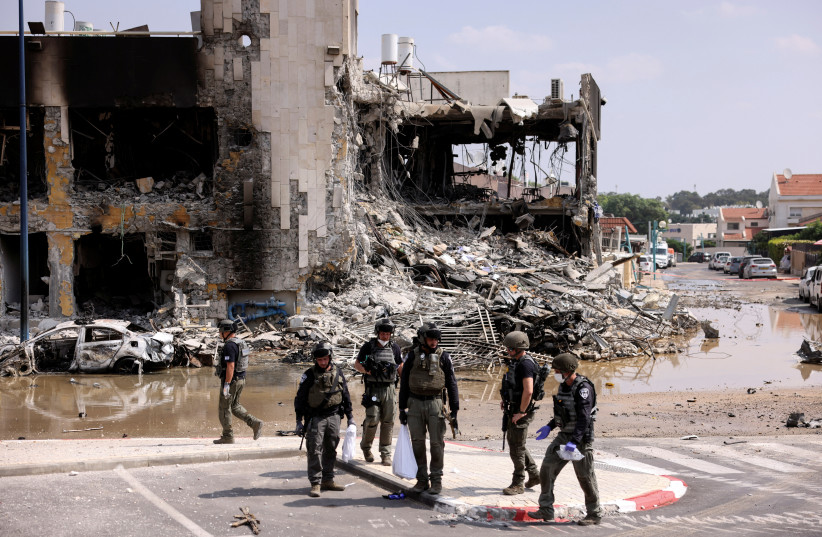One could argue that Israel sustained increasingly deadly Hamas rocket fire for close to two decades because it has refrained from re-occupying Gaza.
Former defense and foreign minister Avigdor Liberman has long pressed this point, stating “We either have to completely occupy it, or reconcile ourselves to endless rounds of rockets.”
In the past he was almost a lone voice, even though it was a prophetic one.
No one would say it this way of course.
But Israel’s top brass and the international community had until Saturday believed that a certain amount of rocket fire against Israel was sustainable, even when it was deadly.

Focused on containing the threat, not eliminating it
The IDF has boasted of deterrence victories in Gaza. Since the IDF’s withdrawal from Gaza in 2005, each of its six wars against Hamas and other terror groups in the Strip have focused on containing the threat, not eliminating it. This included the two wars with ground forces.
Arguments in favor of linking humanitarian assistance to the Strip to a demand for Hamas’ military disarmament were dismissed in favor of sustaining calm through economic incentives.
“We made a huge mistake in imagining that a terror organization can change its DNA and we stupidly began to believe it,” former National Security Advisor Maj.-Gen (res.) Yaakov Amidror told reporters in a briefing organized by Media Central.
Israel has in the past feared the human cost of eliminating Hamas, both in terms of Israeli soldiers and Palestinian civilians. It also lacked international support to retake Gaza in a global arena that increasingly questioned whether its military actions were in fact self-defense or disproportionate offensive operations if not war crimes.
The constraint equation seemed so etched in stone, that even Hamas’ more emboldened moves in the last years in which it threatened rocket fire to protest Israeli action against Palestinians anywhere rather than just in Gaza, did not sway the Israeli military to reexamine its assumptions about the terror group.
It was almost increasingly as if Hamas was holding Israel hostage to perpetual threats of rocket fire and war.
2005 disengagement did not predict this outcome
When Israel in 2005 unilaterally withdrew its settlers and military from Gaza, it did not predict this outcome. It had imagined that the coastal enclave it left under Palestinian Authority control would have peaceful relations with Israel, particularly given that Israel had withdrawn to an internationally recognized border.
That vision ended less than two years later when Hamas violently seized control of the Strip, ousting Fatah in a violent coup. Israeli attempts to force Hamas’ collapse through economic sanctions failed as did efforts to halt the flow of arms into the Strip or its growing ties with Iran.
Settler evacuees had long argued that a day would come when events would force Israel’s hand.
That day may have arrived on Saturday when Hamas launched an unprecedented assault on Israel, infiltrating its border communities killing upwards of 900 people and taking another 100 hostage.
In a video address on Monday, day three of the war which the IDF has dubbed “Swords of Iron,” Netanyahu warned Hamas that it had “made a mistake of historic proportions.”
Israel “will exact a price that will be remembered by them and Israel’s other enemies for decades to come,” he thundered, as he compared Hamas to ISIS.
“Just as the forces of civilization united to defeat ISIS, the forces of civilization must support Israel in defeating Hamas.”
It was a speech that seemed to indicate a shift in Israeli policy when it came to Hamas, particularly as it followed a security cabinet decision to destroy Hamas’ military capability.
The Gaza paradigm of yesterday was erased the moment the Hamas assault began, but does that mean in the new paradigm the IDF should re-enter Gaza and remain there?

Should the IDF re-enter Gaza and remain there?
If ever Israel was to do so, this would be the moment, particularly given that it is already expected to send in ground troops.
From a military perspective, one might argue that Israel has no choice but to reconquer Gaza.
Israeli deterrence rests in part on a mythic understanding of IDF superiority in intelligence, the creative thwarting of potential attacks, and the strength of its preemptive and retaliatory strikes.
An IDF that is vulnerable to Hamas is vulnerable to all its enemies.
The Hamas assault increases the necessity of a decisive Israeli victory, not just to prevent future attacks from the Palestinian terror group but also from Hezbollah in the north and Israel’s larger regional enemies.
It is for this reason that US President Joe Biden has spoken repeatedly about the importance of preventing a larger conflict, hinting that the US would come to Israel’s military defense. It’s a move likely designed to warn those who now might be thinking of attacking Israel, that they could be tangling with the US as well.
Moving the IDF back into Gaza could also be a necessity even if one looks locally at the enmity between Israel and Hamas.
Amidror said that Hamas can only be destroyed from both an air and ground operation.
“It cannot be done only by the air force and the artillery,” he said, adding that Gaza would have to be “reconquered” by ground forces.
Experts like Amidror believe that Israel must now destroy Hamas because the country can’t afford to sustain an attack like this twice. This is not like the rocket threat, where Israel goes in, flattens Hamas targets and leaves, thereby allowing the terror group to rearm and attack again.
It’s likely that even if Israel destroys Hamas’ military capacity, the only way to ensure its continued disarmament is to place the IDF in Gaza permanently.
Then there is the issue of the hostages.
Despite the flurry of attempts to find a diplomatic solution, including pressure on Hamas from Arab states, there are those who argue that the best way to prevent a second such assault is to rescue the hostages rather than negotiate their release.
Col. (Res.), Miri Eisin, who is the managing director of the International Institute for Counter-Terrorism (ICT) at Reichman University, said “This is not going to end without boots on the ground.”

The existence of so many hostages means Israel may need to reconquer all of Gaza, but she cautioned, “I don’t think we want to.”
It’s just that “there are not a lot of options to get [the hostages] back” and “we are not going to negotiate for them, which means we have to go get” them, she said.
“It’s a lose, lose [situation] even if you know where they are,” Eisen said, particularly given the high probability that they will be booby-trapped.
“They took women and children and elderly, which means you have to conquer the Gaza Strip, and even then you do not know where they are or if they will be alive at the end,” she said.
Should Israel want to reconquer Gaza, the considerations that constrained Israel in the past are no longer relevant. Israel’s concern about a high casualty count from a ground operation that would wipe out Hamas, while important, no longer seems like an impossible price to pay.
In the past one could question the necessity of such a move and ponder the senselessness of the loss.
Now it will be seen as a life-saving mission to rescue the hostages, a step in a war that was forced on Israel. The Israeli public is now likely to accept a higher casualty count, particularly if it meant preventing a second such assault and saving what could be another 1,000 victims.
It is also possible that the International community, which would have rejected the move in the past, could now support it.
The senseless Hamas killing on Saturday of so many civilians, including entire families in their homes and young adults at a music festival, to say nothing of foreigners, has generated strong and uniquely timed international support for Israeli military activity against Hamas, including an IDF return to Gaza. This is especially true if it also pushed Iran out of the Strip.
Foreign Affairs and Defense Committee Chairman Yuli Edelstein, who opposed Israel’s withdrawal from the Strip in 2005, said the question was premature even though it was clear that Israel didn’t plan to execute a military operation and then hand Gaza back to Hamas as it had done in the past.
‘But between this and full [IDF] control, there is a huge distance and so there is a possibility to conquer Gaza and probably divide it into several areas.
“It could be the Palestinian Authority that would rule some of these areas,” Edelstein said.
“Right now I think that the mission is to destroy all the military and other abilities of Hamas and only if we meet this challenge and this goal will it be possible to talk about the future of Gaza,” Edelstein said.
He cautioned that “this whole discussion just complicates the situation.”
“Right now there must be a clear message that Hamas is not a player anymore, neither in Gaza or anywhere else.”
“As long as Hamas is singing ‘I am still standing,’ then it will be a problem.”
